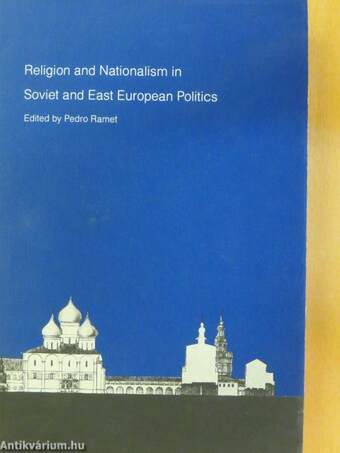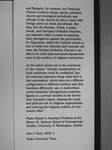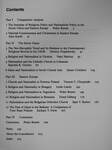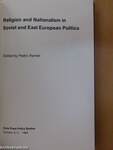1.035.017
kiadvánnyal nyújtjuk Magyarország legnagyobb antikvár könyv-kínálatát

VISSZA
A TETEJÉRE
JAVASLATOKÉszre-
vételek
Religion and Nationalism in Soviet and East European Politics
| Kiadó: | Duke University Press |
|---|---|
| Kiadás helye: | Durham |
| Kiadás éve: | |
| Kötés típusa: | Fűzött keménykötés |
| Oldalszám: | 282 oldal |
| Sorozatcím: | Duke Press Policy Studies |
| Kötetszám: | |
| Nyelv: | Angol |
| Méret: | 24 cm x 16 cm |
| ISBN: | 0-8223-0608-5 |
naponta értesítjük a beérkező friss
kiadványokról
naponta értesítjük a beérkező friss
kiadványokról
Fülszöveg
Religious organizations in many countries of the communist world have served as agents for the preservation, defense, and reinforcement of nationalist feelings, and in playing this role have frequently been a source of frustration to the Communist Party elites. Although—as this book points out—the relationship between governments and religious groups varies according to the particular country and group in question, the mosaic of these relationships constitutes a revealing picture of the political forces shaping the lives of Soviet and East Euro-pean citizens.
As the historical core of culture that guided the evolution of primitive tribes into poli-tically conscious nations, religion is a con-stitutive element in the identity of most nationality groups. It acts as a badge of group identity distinguishing "us from them." It has been in the forefront of the development of national languages and national literature, and its leaders are often among the most respected and most... Tovább
Fülszöveg
Religious organizations in many countries of the communist world have served as agents for the preservation, defense, and reinforcement of nationalist feelings, and in playing this role have frequently been a source of frustration to the Communist Party elites. Although—as this book points out—the relationship between governments and religious groups varies according to the particular country and group in question, the mosaic of these relationships constitutes a revealing picture of the political forces shaping the lives of Soviet and East Euro-pean citizens.
As the historical core of culture that guided the evolution of primitive tribes into poli-tically conscious nations, religion is a con-stitutive element in the identity of most nationality groups. It acts as a badge of group identity distinguishing "us from them." It has been in the forefront of the development of national languages and national literature, and its leaders are often among the most respected and most edu-cated national figures, having throughout history stepped into leadership roles in the political sphere. Further, because encounters with other nationality groups having different religious practices encour-age the feeling that a certain religion is peculiarly a group's own, religion is sometimes considered to be essential to a group's survival.
These considerations, important in any political discussion, become perhaps more significant in the context of communist regimes, which have tended to view religion as a threat to their organizational and ideo-logical monopoly and as an impediment to their utópián program. Yet the manner in which the regimes have dealt with the vari-ous religious bodies in the Soviet bloc has shown remarkable diversity and provides unique insights into the politics of the Soviet Union and East Europe. In Romania
and Bulgaria, for instance, the Orthodox Church conducts liturgy openly, publishes church and theological periodicals, and officials of the church are free to meet with foreign clerics at home and abroad. But they, like the Russian, Polish, Czecho-slovak, and Georgián Orthodox churches, are impotent when it comes to asserting their prerogatives against the government. In Yugoslavia, where the Catholic church is free to build new churches and renovate old ones, the Serbian Orthodox Church is un-able to do either and encounters harassment even in the conduct of religious instruction.
As the editor points out in his conclusion to the volume, "Similar considerations of local conditions could be multiplied, but the essential argument being made here is that nationalism, which takes on a different configuration in different contexts and thus functions differently, say, in multi-ethnic versus ethnically homogeneous countries, figures as a pivotal variable in the Soviet-East European region, shaping the social and political role of religious organizations and coloring the religious policies of com-munist elites."
Pedro Ramet is Assistant Professor at the Henry M. Jackson School of International Studies, University of Washington, Seattle.
isbn 0-8223-0608-5 Duke University Press Vissza
Témakörök
- Idegennyelv > Idegennyelvű könyvek > Angol > Vallás > Kereszténység
- Idegennyelv > Idegennyelvű könyvek > Angol > Történelem > Európa története > Egyéb
- Történelem > Idegennyelvű > Angol
- Történelem > Kontinensek szerint > Európa, európai országok története > Kelet-Európa > Oroszország, Szovjetúnió
- Történelem > Kontinensek szerint > Európa, európai országok története > Kelet-Európa > Egyéb
- Történelem > Legújabb kor > A hidegháború kora (1946-1991)
- Történelem > Politika > Ideológiák > Nacionalizmus
- Történelem > Politika > Ideológiák > Kommunizmus > Egyéb
- Történelem > Tanulmányok
- Vallás
- Vallás > Kereszténység
- Vallás > Kereszténység > Tanulmányok
- Történelem > Kontinensek szerint > Európa, európai országok története > Közép-Európa > Egyéb











